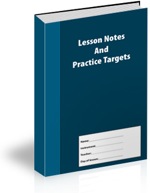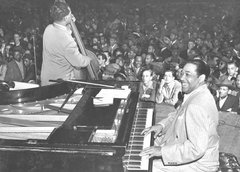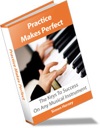Commit to practice early in the day and don't put it off. Make a rule on certain days to practice before you go out anywhere
Remember: 6 - 8 weeks away from your instrument can mean putting yourself back months. Do you really want to have wasted all the time you spent in the previous semester - just so you can sit on the sofa, flicking through the endless TV channels and complaining there is nothing on?
These are just a few techniques for teachers and students. For more information read Practice Makes Perfect
2) New Lesson Notes and Practice Targets book coming soon!
 After a flood of emails thanking me for the sheets I made available on the downloads pages of the Essential Music Practice website in December last year, I have been receiving more and more asking if these would ever be incorporated into a booklet, since students often end up losing sheets and don't want to carry a big ringbinder around with them all the time.
After a flood of emails thanking me for the sheets I made available on the downloads pages of the Essential Music Practice website in December last year, I have been receiving more and more asking if these would ever be incorporated into a booklet, since students often end up losing sheets and don't want to carry a big ringbinder around with them all the time.
Good news! The booklet is almost done! I am in the final stages of editing right now - and only taking a break to get Perfect Practice out!.
The booklet is based on the downloads available from the Essential Music Practice site. It contains a double page spread for making notes during the current lesson and noting targets for the next lesson. There is a section each week for students to plan their practice targets for individual practice sessions and a page for extra targets or notes (including 4 staves of blank staves). There are also additional goal setting and review pages as well as some tips on how to get the most from music practice time.
I need your help! I need to decide on the size (number of pages/lessons) in the booklet. I have prepared a short - only 2 questions and a space for any comments you might have - survey. If you have a minute spare please click here to help select the most useful format. I really want this book to be helpful and support both teachers and students so your time is appreciated. You don't have to enter your name or email address. The survey will be available until June 16th so please help if you can. Thank you.
3)Practice tip of the month - The hardest part
This month's tip is based on a quote from Duke Ellington, one of the most influential musicians in American history. He said
"A problem is a chance for you to do your best."

I often quote this to students who are learning a piece with a particularly challenging section for their level and challenge them to make this the best section of the whole piece. This is achieved step by step through breaking the section down (separate hands if on the piano), practising slowly, always with 100% correct notes and being very exacting about technique
Students begin to enjoy these challenges because they realise that once they can play the hardest part of a piece the rest is easier to learn. I often start them off on the hardest section and refuse to let them learn the beginning until the hardest part is perfect...the students sometimes 'defy' me by secretly learning the start of the piece so they can play 'the tune' in addition to learning the hardest part. The student wins either way! Students also find that really getting into the techniques needed for the hardest part of a piece improves their progress in other areas as well. If there are particular timing difficulties in the hardest section to be worked on, students often end up with a better idea of timing in other pieces. This is true of articulation, dynamics and phrasing techniques as well.
Next time you or a student is learning a piece with a particularly tricky section in it, remember Duke Ellington. Use the 'problem' as a chance for you to excel. The benefits come in performance as well...everybody else is worried about 'the hard part' but to those who followed this advice that particular 'hard part' doesn't exist!
4)Software tip - Using Sequencers during practice
There are many computer sequencers available, such as Logic, GarageBand, Cubase, Cakewalk and Digital Performer. All of these do basically the same job, certainly as far as practice is concerned. Using a sequencer is mainly for piano/keyboard players - although MIDI guitars and wind controllers are available.
I find there are a several basic ways a sequencer can be used when practising. Audio recording
It can be used as basic audio recording device to record your practice, listen back and evaluate your playing. One problem we often face is concentrating so hard on our playing we forget to listen - the most important thing to do! Having a sequencer isn't a replacement for listening to your playing while playing - but it does help get an overall impression of how you sound. The best thing to do is to play back and follow the score and mark in your mistakes with a pencil so you know which parts need practising...and it's often not the parts you think it is! Useful though computers can be for audio recording (especially if you have a MacBook and GarageBand) i prefer my soon-to-be-replaced MOTU Microtrack for being out of the box and recording within a few seconds...and it is so portable!
Midi Sequencing
This is the same as audio recording in a sense, although you need to have your instrument plugged into a MIDI socket for this one. If you have a keyboard or electric piano with MIDI you can start the metronome and record your practice. It is interesting to see how near the original score you are when you check the score of your recording. I also like to switch the metronome off and play through pieces and see how close I am to keeping time!
Looking at the score after sequencing can be very telling...especially in terms of fluffed notes! I also sometimes torture myself by slowing the tempo down considerable and exposing any timing inaccuracies!
Sequencers are great for practising scales and arpeggios too. You can quickly find out week scales and again, see where you fluff notes in arpeggios. And you can turn the tempo right up, see how well you can keep in time!
If you are a wind player you need something similar to the Yamaha WX5 or Akai EWI4000s. These are great instruments in their own right (I have the Yamaha connected to a VL-70m) - but practising them is not like practising a clarinet or sax, so really this is only an option for those wanting to excel at that particular instrument.
Inputting pieces: Step in time!
This is something i did a long, long , long time ago! I was borrowing a Yamaha QX5 hardware sequencer from a friend when I was around 16. I had never used anything so amazing in my life at the time. You could record into it, and record again over the top of the first recording...you could edit note, timing...Wow! I was hooked from that moment!
I used the QX5 to record various pieces - perfectly! Pieces that I could only play parts of at the time. One I remember doing was Beethoven's Waldstein Sonata. I recorded slowly, separate hands, some parts over and over and over again, getting every aspect of the performance right. Eventually I finished. I had a recording of me 'playing' this very difficult Sonata... I listened to it over and over again. I could hardly believe I had done it...then a strange thing occured. I found I could actually play most of the sonata - and from memory! If only I had made the connection at the time between the amount of slow, careful, 100% correct repetition...and being able to play the piece! But, of course, at the time I thought playing through from start to finish was the way to practice! I didn't make the connection until much later!
Following this model, I have sometimes set piano students with a digital piano and sequencer the task of inputting a perfect version of a piece they are having problems with. This is normally perceived as 'better than having to practise' - but, of course involves all the important elements of practice! If you are a pianist and there is a particular piece you are stuck on - it might be worth giving it a try!
Next month's featured software: Perfect Pitch packages: can you really learn perfect pitch?.
If you have something to say about practice in general, a tip to help other readers, you want to share a practice related story or you would like to contribute an idea or article to the Perfect Practice newsletter please click here to contact me.
Thanks for reading!
Simon
P.S. For more information read Practice Makes Perfect

This is the book that will revolutionize your practice technique and make your practice more effective and efficient.
Click here to read more about Practice Makes Perfect
Copyright info
I'm not a big fan of the way copyright laws operate in the world today. I could spend a huge amount of my time surfing the internet looking for people who have copied or translated parts of the Essential Music Practice site or Perfect Practice newsletters...however, I think it would be far more valuable to spend my time researching practice further and getting the information out to other musicians. Therefore, you are free to copy, forward or reproduce the content in this e-zine in any form you wish. I would appreciate an attribution and/or a link back to the Essential Music Practice website - but if you don't I won't come chasing you. I am a great fan of Creative Commons, but this is not under a creative commons license. You are free to use the information in any way whether commercial or non-commercial...if you make a million you can buy me a drink sometime!
New! Comments
Have your say about what you've just read! Leave me a comment in the box below.



